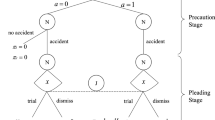Abstract
If the defendant in a lawsuit is better informed than the plaintiff about the value of damages that could potentially be assigned by the court, biasing the burden of proof toward the plaintiff may lower aggregate efficiency losses from litigation.
Similar content being viewed by others
References
Baye, M. R., Kovenock, D., & de Vries, C. G. (1996). The all-pay auction with complete information. Economic Theory, 8, 362–380.
Baye, M. R., Kovenock, D., & de Vries, C. G. (2005). Comparative analysis of litigation systems: an auction-theoretic approach. Economic Journal, 115, 583–601.
Bernardo, A. E., Talley, E., & Welch, I. (2000). A theory of legal presumptions. Journal of Law, Economics, and Organization, 16, 1–49.
Dari-Mattiacci, G., & Parisi, F. (2005). Rents, dissipation and lost treasures: rethinking Tullock’s paradox. Public Choice, 124, 411–422.
Farmer, A., & Pecorino, P. (1999). Legal expenditure as a rent-seeking game. Public Choice, 100, 271–288.
Hay, B. L., & Spier, K. E. (1997). Burdens of proof in civil litigation: an economic perspective. Journal of Legal Studies, 26, 413–431.
Hillman, A. L., & Riley, J. G. (1989). Politically contestable rents and transfers. Economics & Politics, 1, 17–39.
Hillman, A. L., & Samet, D. (1987). Dissipation of contestable rents by small numbers of contenders. Public Choice, 54, 63–82.
Hirshleifer, J., & Osborne, E. (2001). Truth, effort, and the legal battle. Public Choice, 108, 169–195.
Katz, A. (1988). Judicial decision making and litigation expenditure. International Review of Law and Economics, 8, 127–143.
Konrad, K. A. (2002). Investment in the absence of property rights: the role of incumbency advantages. European Economic Review, 46, 1521–1537.
Krishna, V., & Morgan, J. (1997). An analysis of the war of attrition and the all-pay auction. Journal of Economic Theory, 72, 343–362.
Parisi, F. (2002). Rent-seeking through litigation: adversarial and inquisitorial systems compared. International Review of Law and Economics, 22, 193–216.
Posner, R. A. (1992). Economic analysis of law (4th ed.) Boston: Little, Brown.
Posner, R. A. (1999). An economic approach to the law of evidence. Stanford Law Review, 51, 1477–1546.
Sanchirico, C. W. (1997). The burden of proof in civil litigation: a simple model of mechanism design. International Review of Law and Economics, 17, 431–447.
Sanchirico, C. W. (2008). A primary-activity approach to proof burdens. Journal of Legal Studies, 37, 273–313.
Tullock, G. (1967). The welfare costs of tariffs, monopolies, and theft. Western Economic Journal, 5, 224–232.
Tullock, G. (1975). On the efficient organization of trials. Kyklos, 28, 745–762.
Wärneryd, K. (2000). In defense of lawyers: moral hazard as an aid to cooperation. Games and Economic Behavior, 33, 145–158.
Wärneryd, K. (2003). Information in conflicts. Journal of Economic Theory, 110, 121–136.
Author information
Authors and Affiliations
Corresponding author
Rights and permissions
About this article
Cite this article
Wärneryd, K. Nine points of the law: evidentiary rules and the costs of litigation. Public Choice 153, 279–285 (2012). https://doi.org/10.1007/s11127-011-9793-z
Received:
Accepted:
Published:
Issue Date:
DOI: https://doi.org/10.1007/s11127-011-9793-z




